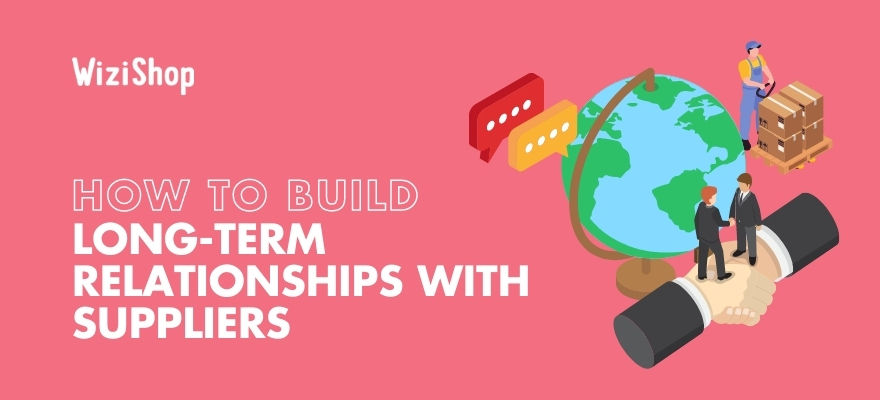For your business to work, it’s important that it rests on a solid and qualitative foundation. The management of purchases and sales has to be handled with the utmost care, especially in the case of ecommerce companies, in line with your business vision.
In this sense, it’s essential to find competent and efficient suppliers and to maintain a long-term interaction with them. The relationships you can have with your professional entourage will be responsible for a large number of elements, between benefits and risks. Customer-supplier relationships are paramount in the ecommerce process!
So, how do you make this relationship work perfectly and help prevent it from becoming unbalanced? Here are some tips to set up a healthier partnership, one that respects both parties.
Succeeding in the prospecting and casting phase
Achieving great communication in your relationships with your business’s suppliers is a long-term task, which begins with the prospecting process. In the beginning, it’s important to find the right partner and to establish a good foundation with them, one of the keys to your future success!
1. Identify your main criteria necessary for the success of your business
Before you start the process of looking for suppliers and purchasing products to sell via your online store, it’s first necessary to clearly identify your expectations.
To do this, I strongly advise you to draw up a table with the information and criteria that seem most important to you. It’s absolutely essential to know beforehand what you expect from your suppliers!
It’s based on these elements that you’ll then establish a selection in accordance with your choices and your practices.
2. Try to learn about your competitors' suppliers
Because it's important to constantly monitor many areas to refine the sales strategy for your business, it also bodes well to monitor various information from your competition such as purchasing and supply management as well as their suppliers.
Of course, this means learning about the partners of the leaders in your industry. If they are in such a good position, it’s most likely that they work with competent suppliers and provide more efficient solutions to their customers' demands.
On the other hand, remember to also note the suppliers of companies who are struggling in your market. This can be a warning sign when deciding who to sign your contract with. Be careful if you opt to work with them...
3. Select and contact reliable suppliers
There are several sources that can help you find and select reliable suppliers when it comes to purchasing products or supplies. It’s up to you to search online, in professional directories, through your local chamber of commerce, at trade shows or professional events, or via social networks.
In your search, remember to pay particular attention to the price-quality ratio of the products, production, other services, and delivery times, and the stability and reputation of the wholesaler in order to be able to carry out an evaluation of the offers on the market and thus choose the best offer for your cash flow.
Then, all you have to do is contact the selected supplier(s), either by email or directly by phone. The ideal is then to arrange an initial meeting to really take the time to negotiate the conditions of your future partnership.
Really take the time to evaluate whether you’re conducting your research online or offline to compare the practices and the data related to your suppliers according to your criteria: they’ll be responsible for the successful development of your business in the long term.
4. Start your collaboration on the right footing
The first meeting is an opportunity to set the basis for your collaboration. This is the right time to build trust in your relationship so that both parties can reap real benefits. Take the time to discuss and explain your arguments, detail your strategy, and prepare all the documents that will help your future partner to better understand your practices and your management but also the relationships you usually build with your product suppliers if you’re used to this type of collaboration.
In addition, be sure to listen to your supplier's arguments. Once common ground is found, it’s advisable to put these foundations in writing and to have them validated by each party, to avoid all possible risks and optimize your purchases.
It’s then necessary that the meeting ends without any frustration on either side. It’s only on this condition that you’ll improve your chances of building a healthy and long-lasting relationship in order to move forward on good terms with your partner.
Creating a trusting relationship based on win-win
As you can see, the best collaboration is one in which both parties benefit. You need to establish a win-win situation.
This is an essential basis for retaining your best suppliers, who’ll be responsible for your product catalog, while also getting you good financial results.
5. Learn to understand your supplier's expectations and needs
Unless you’re very lucky, chances are that your supplier won’t be able to meet all of your expectations...at least not right away!
Just like you, your supplier is a business that must respect certain margins in order to operate. Very often, a supplier will only apply a preferential rate beyond a certain quantity ordered. This isn’t a simple "punishment" or a forced sales process...
This is due to the economy of scale obtained when manufacturing and/or shipping large quantities. So try to understand your supplier and put yourself in their shoes. When a disagreement arises, it’s essential to continue to communicate.
6. Find common ground and write down your terms
Negotiation between the company and a supplier involves many different elements. It may involve discussing the following:
- pricing,
- quality of products and service provided,
- terms of payment,
- delivery times,
- a possible confidentiality clause,
- order tracking process,
- conditions for terminating the contract, etc.
All these elements must be discussed at the beginning of the partnership: they’re the keys to your contract. They must then be clearly written down. Also think about including a clause stipulating the penalties in case of non-compliance with the initial agreement.
7. Be transparent about your expectations and requirements
To maintain a lasting relationship, transparency is the key word. You must therefore remain clear and firm about your requirements. Whether your partner likes it or not, you must share your expectations precisely, even if it means creating competition between several of your suppliers.
In the event that conflicts arise, consider appointing a third party to manage them. This appointment should ideally be made at the very beginning of your collaboration. This can sometimes improve your chances of not having to go to court!
Then, take advantage of all the technological tools at your disposal. Today, there are all kinds of software programs to allow for better communication and easier management of your invoices. These are excellent allies in avoiding unpaid invoices.
Dematerialized invoices offer many advantages for your business. They allow you to reduce processing costs and to send documents to your customers more quickly. They’re much easier to process.
In addition, some software programs have an automatic invoice recognition system. Their validation is thus more fluid and faster. An automatic reminder system is also integrated. Take advantage of this for your ecommerce business!
8. Set up an efficient communication system
To maintain a good relationship with your supplier, it’s essential to keep in touch regularly. For that, think of organizing meetings at frequent intervals, to allow you to judge the evolution of your partnership. These exchanges are also great moments to set up new conditions of collaboration, when the previous ones no longer suit either of the parties.
Here again, new technologies are your allies! Your suppliers won’t necessarily be located close to your company. So think about using different online means to better stay in touch with them, such as WhatsApp, Telegram, emails, social networks, or even video.
9. Always be polite, courteous, and available to your supplier
Just like you would with a customer, absolutely try to always be polite and never get carried away. As in a couple, when you have a long-distance relationship with a professional partner, it’s absolutely impossible to always agree.
However, it’s crucial to discuss things as much as possible in a calm environment. Always be open to dialogue and be courteous. Remember that this is the best way to achieve your goals and get the most out of your collaboration.
Final thoughts
At first glance, the collaboration between a company and its suppliers may seem simple. However, it’s far from being just a few orders, deliveries, and invoice payments.
In reality, establishing a healthy relationship with your suppliers addresses several important challenges that your business may face. The first are strategic and financial. Working with a reliable supplier prevents you from having undelivered orders or an out-of-stock product.
The next challenge is operational. It allows us to respect the production schedule. On the contractual and legal level, a good partnership can help prevent legal conflicts. Finally, it’s a crucial element in order not to damage your business’s reputation.










